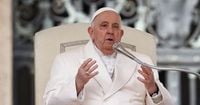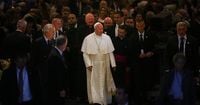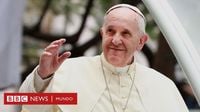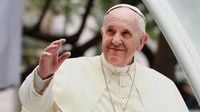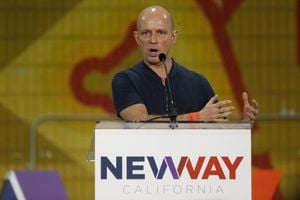Pope Francis, the first Latin American pontiff and the first Jesuit to hold the papacy, died on April 21, 2025, at the age of 88, as confirmed by the Vatican. His passing marks the end of a transformative 12-year papacy that began on March 13, 2013, following the resignation of his predecessor, Benedict XVI.
Born Jorge Mario Bergoglio on December 17, 1936, in Buenos Aires, Argentina, he rose from humble beginnings to become a global religious leader. His election as pope was historic, as he was the first non-European bishop of Rome since Gregory III in 741. He was also notable for his rejection of the trappings of papal luxury, opting instead for a simpler lifestyle that reflected his commitment to the poor.
Upon his election, Bergoglio chose the name Francis in honor of St. Francis of Assisi, symbolizing his dedication to humility and social justice. He famously stated, "I would like a poor Church for the poor," setting the tone for his papacy. His informal approach included receiving cardinals while standing and sharing a bus with them instead of using the papal limousine, a gesture that resonated with many.
Throughout his papacy, Pope Francis focused on issues such as poverty, migration, and climate change, often speaking out against neoliberalism and corruption. His advocacy for the marginalized and his push for a more inclusive Church earned him both praise and criticism. He was viewed as a reformist who sought to bridge the gap between traditionalists and progressives within the Catholic Church.
Francis's health had been a concern in the months leading up to his death. He was hospitalized in February 2025 due to a severe respiratory infection that developed into bilateral pneumonia. The Vatican reported that he had a "complex clinical picture" requiring intensive medical care. His last public appearance was on Easter Sunday, April 20, 2025, when he blessed the faithful from St. Peter's Square.
As the news of his death spread, reactions poured in from around the world. Many reflected on his legacy, which included a commitment to social justice and interfaith dialogue. He was recognized for his efforts to improve relationships with other religions, including Islam and Orthodox Christianity. His outreach extended to marginalized communities, including LGBTQ+ individuals, whom he welcomed but also maintained traditional Church teachings regarding marriage and family.
In addition to his social advocacy, Pope Francis faced significant challenges during his tenure, particularly regarding the clerical sexual abuse crisis. He took measures to address abuse within the Church, including the removal of church leaders who failed to act against abusers. In 2019, he dismissed the entire leadership of the Church in Chile for their inadequate response to abuse allegations. Yet, he faced criticism for not doing enough to combat the culture of silence surrounding these issues.
His papacy was also marked by a commitment to environmental issues, exemplified by his encyclical "Laudato si'" in 2015, which called for action on climate change and the protection of the planet. He emphasized the moral responsibility of all people to care for creation and the poor, linking ecological sustainability with social justice.
As the world mourns the loss of Pope Francis, preparations are underway for a conclave to elect his successor. This process, steeped in tradition, involves the College of Cardinals gathering in the Vatican to vote for the new pope. The conclave will be a significant event, as it not only determines the future leadership of the Catholic Church but also reflects the ongoing evolution of the Church in a rapidly changing world.
During his papacy, Francis traveled extensively, visiting over 60 countries and addressing global issues from poverty to migration. His commitment to dialogue and peace was evident in his efforts to mediate conflicts and promote understanding among different faiths.
Despite his many achievements, some critics argue that he did not move quickly enough to implement reforms, particularly regarding the Church's handling of sexual abuse cases. Nonetheless, many view him as a pivotal figure in modern Catholicism, one who aimed to steer the Church toward a more compassionate and inclusive future.
As the Church reflects on his legacy, it is clear that Pope Francis's impact will be felt for years to come. His dedication to the poor, his call for social justice, and his efforts to engage with the broader world set a new standard for the papacy.
In the wake of his passing, many will remember him not only for his role as a spiritual leader but also as a champion of the marginalized and a voice for the voiceless. His life and work will continue to inspire many around the globe.
